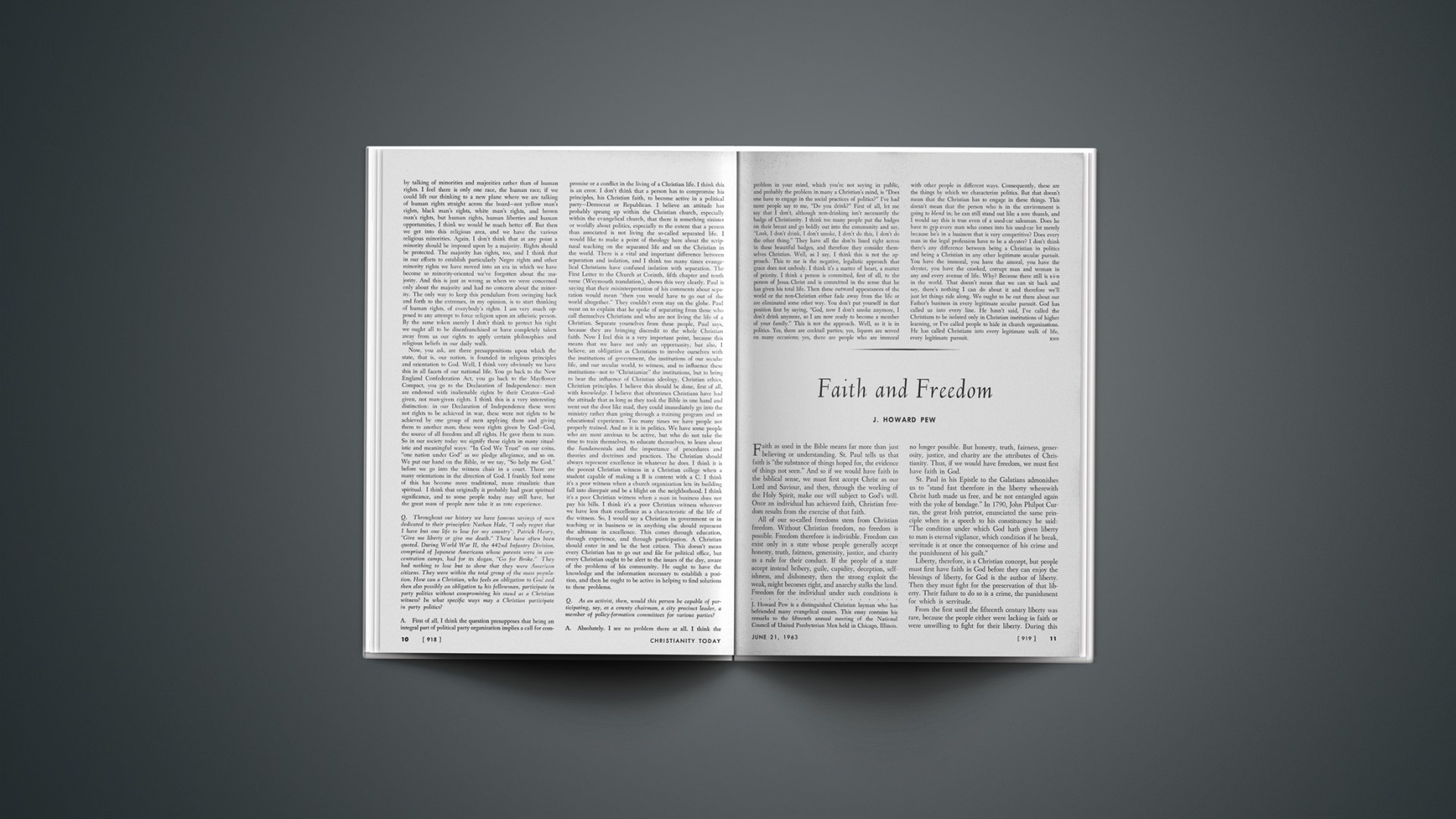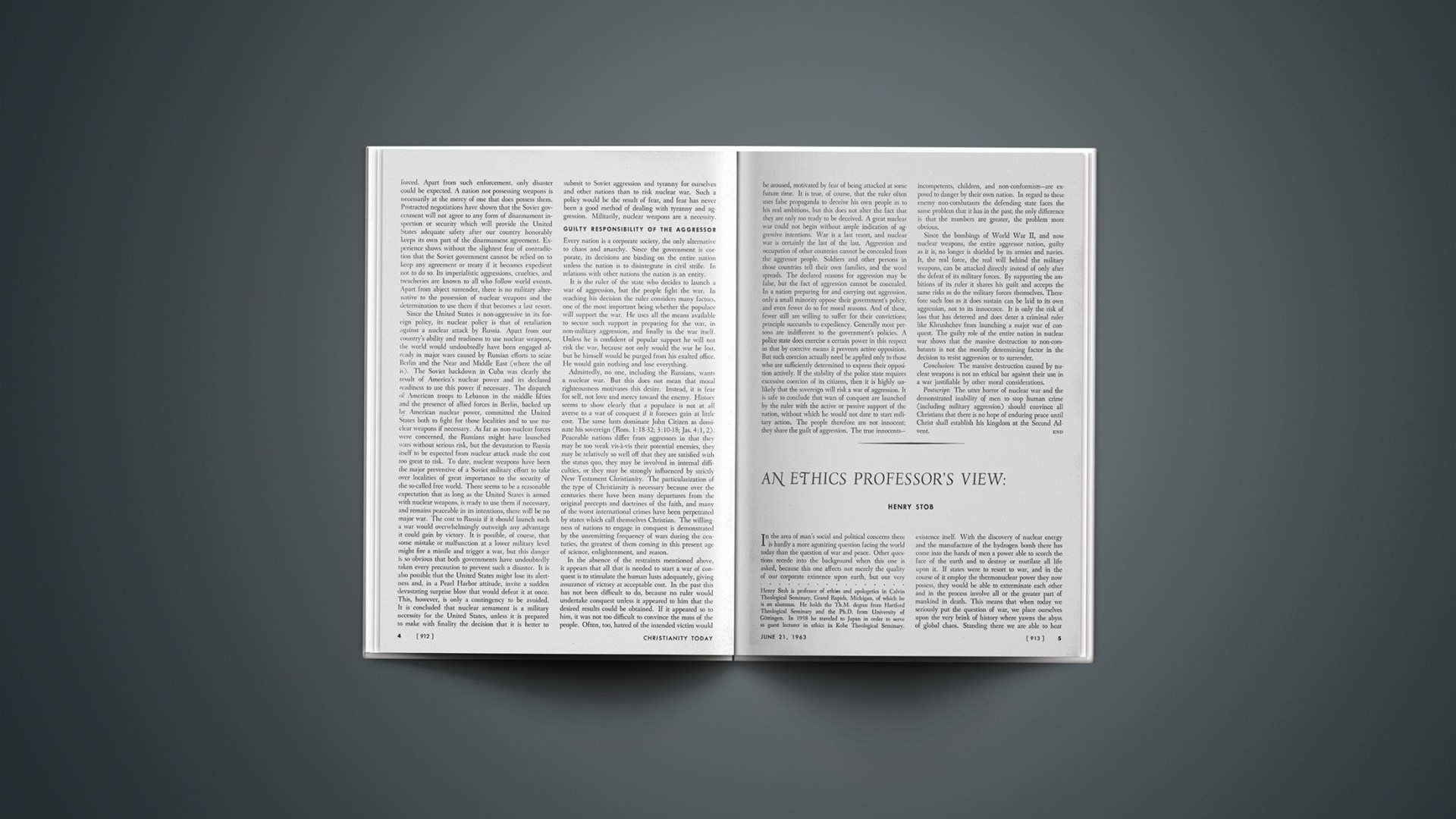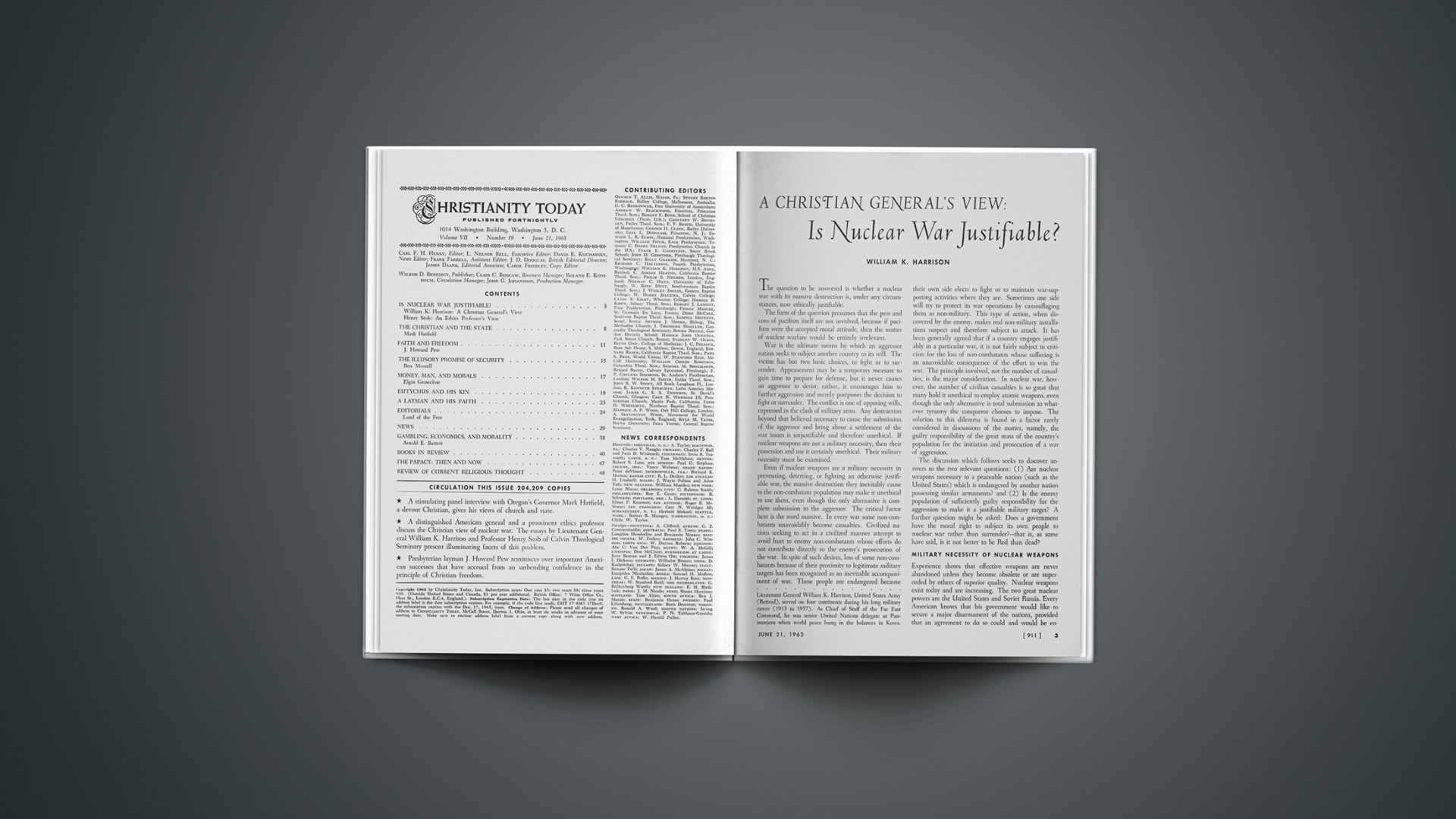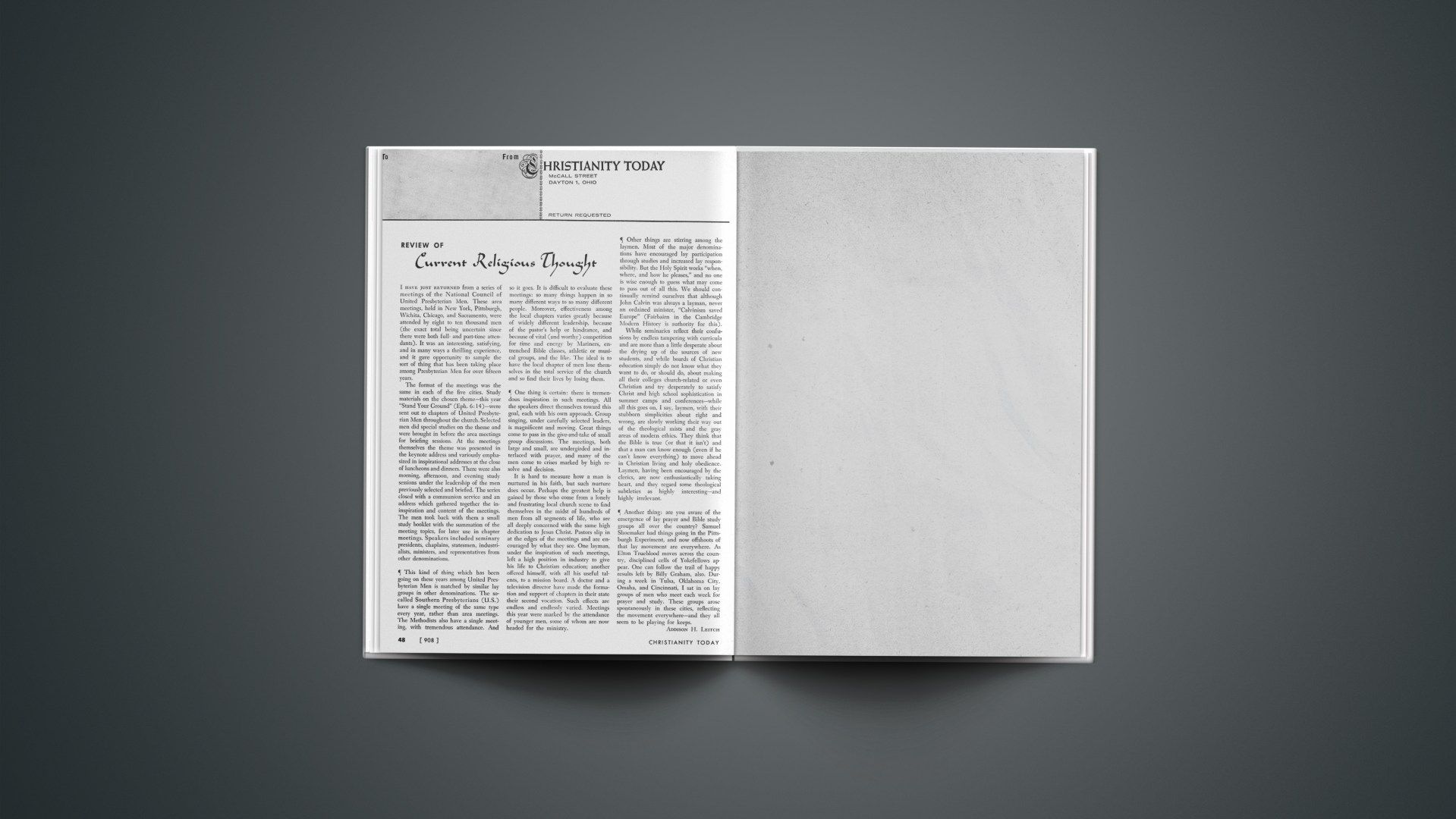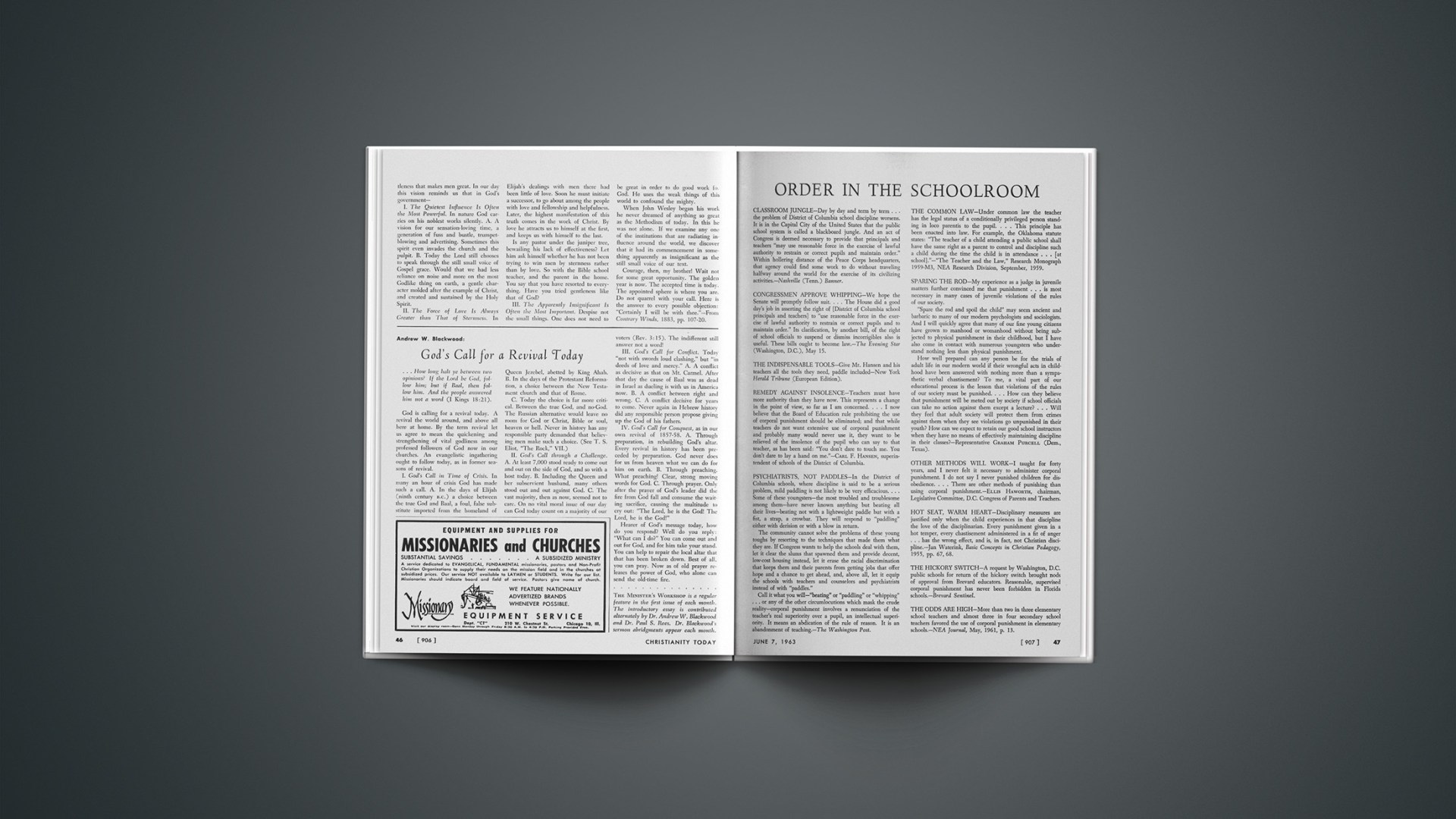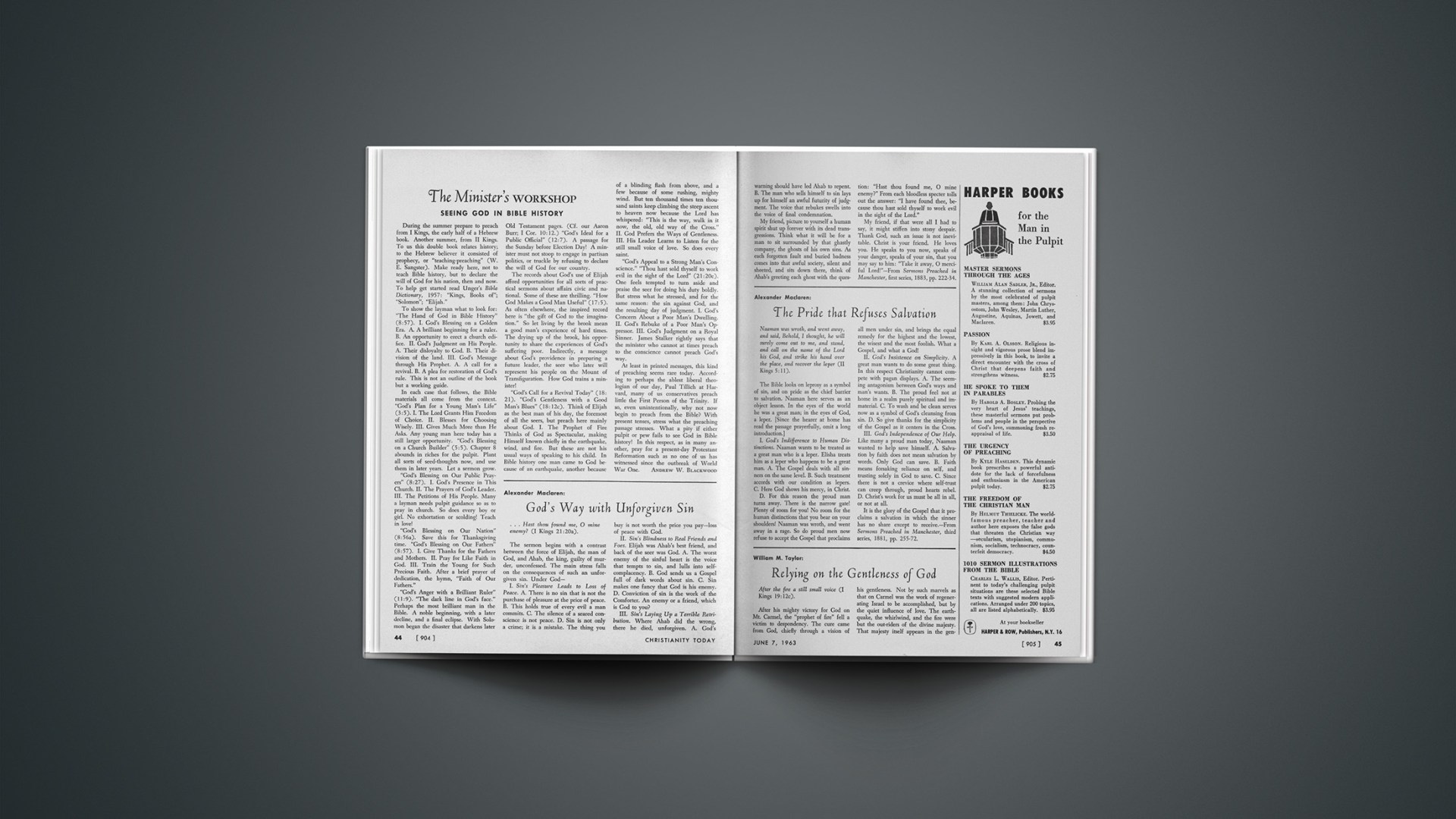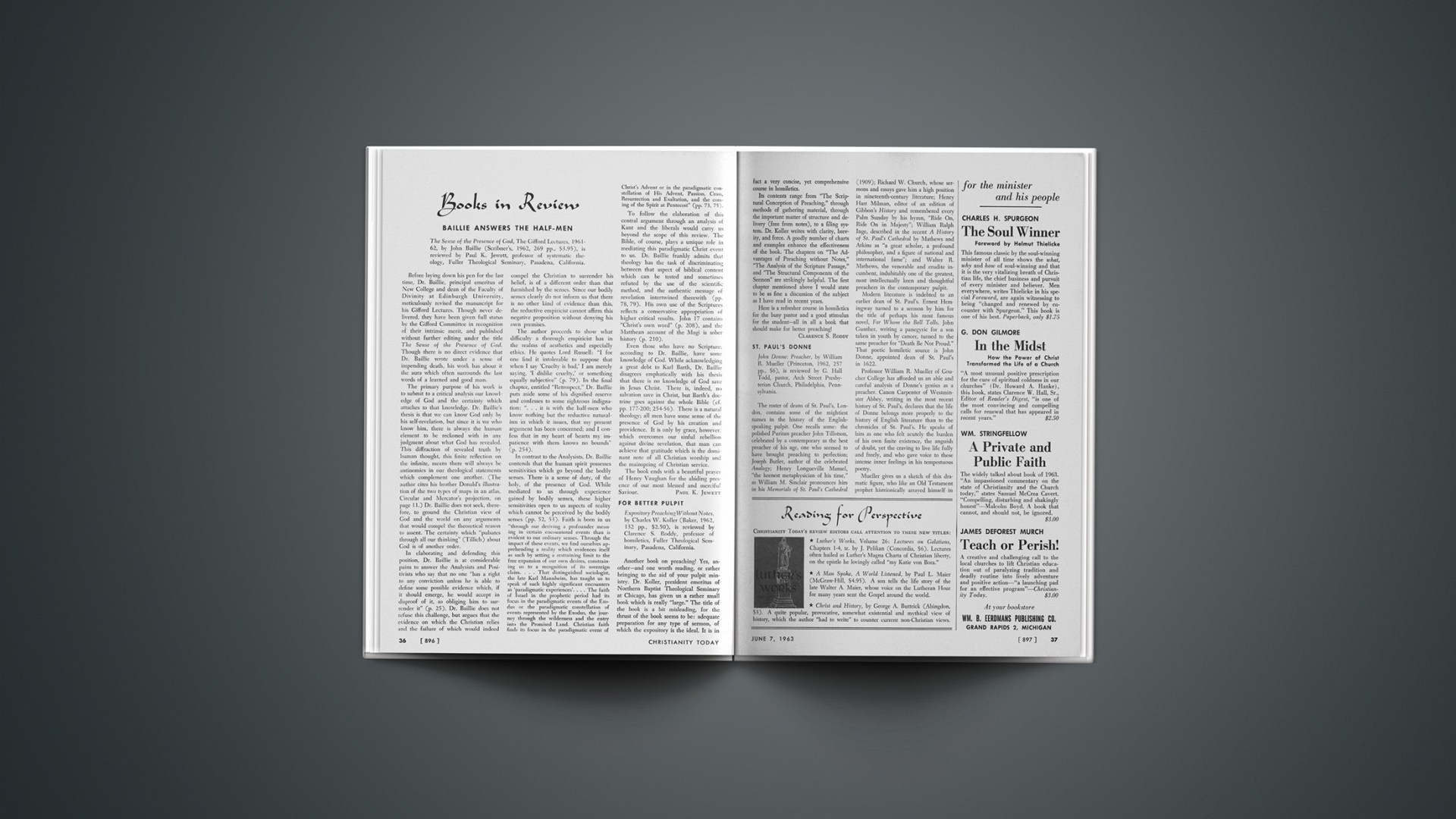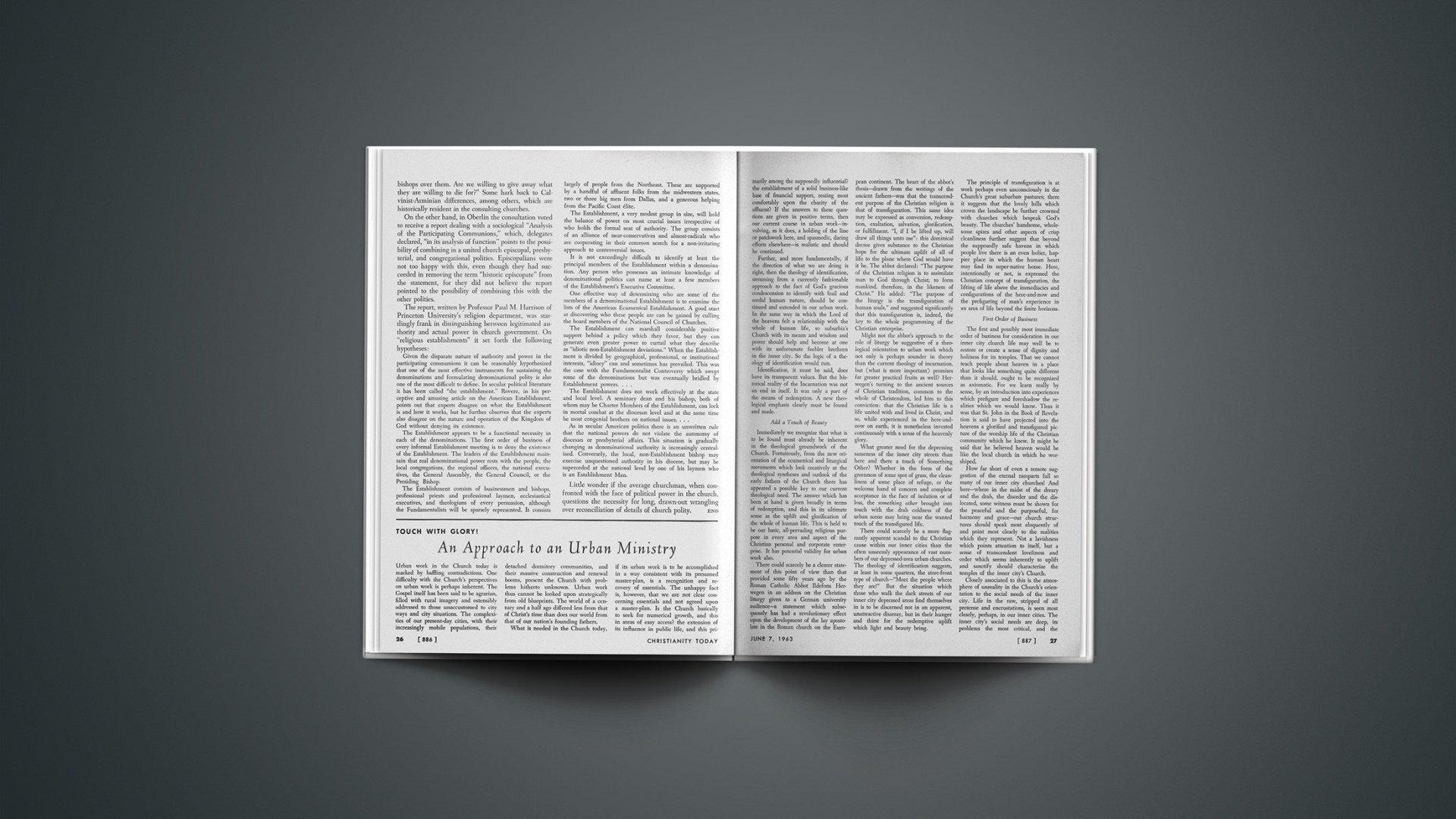Faith as used in the Bible means far more than just believing or understanding. St. Paul tells us that faith is “the substance of things hoped for, the evidence of things not seen.” And so if we would have faith in the biblical sense, we must first accept Christ as our Lord and Saviour, and then, through the working of the Holy Spirit, make our will subject to God’s will. Once an individual has achieved faith, Christian freedom results from the exercise of that faith.
All of our so-called freedoms stem from Christian freedom. Without Christian freedom, no freedom is possible. Freedom therefore is indivisible. Freedom can exist only in a state whose people generally accept honesty, truth, fairness, generosity, justice, and charity as a rule for their conduct. If the people of a state accept instead bribery, guile, cupidity, deception, selfishness, and dishonesty, then the strong exploit the weak, might becomes right, and anarchy stalks the land. Freedom for the individual under such conditions is no longer possible. But honesty, truth, fairness, generosity, justice, and charity are the attributes of Christianity. Thus, if we would have freedom, we must first have faith in God.
St. Paul in his Epistle to the Galatians admonishes us to “stand fast therefore in the liberty wherewith Christ hath made us free, and be not entangled again with the yoke of bondage.” In 1790, John Philpot Curran, the great Irish patriot, enunciated the same principle when in a speech to his constituency he said: “The condition under which God hath given liberty to man is eternal vigilance, which condition if he break, servitude is at once the consequence of his crime and the punishment of his guilt.”
Liberty, therefore, is a Christian concept, but people must first have faith in God before they can enjoy the blessings of liberty, for God is the author of liberty. Then they must fight for the preservation of that liberty. Their failure to do so is a crime, the punishment for which is servitude.
From the first until the fifteenth century liberty was rare, because the people either were lacking in faith or were unwilling to fight for their liberty. During this period there was little or no material progress; each generation lived just as did its forebears. Population was controlled by the amount of food that could be produced, and a large percentage of the people died of starvation. Then in the fifteenth century came the Reformation. Under the Reformation men’s consciences were freed. Thereafter they were able to exercise their genius, initiative, and ingenuity. Machines gradually increased the productive capacity of labor on the farms. One hundred and fifty years ago it required 90 per cent of the American people to produce sufficient food to maintain our population. Today 8 per cent of the American people produce more food than our entire population can consume.
For over a hundred years freedom flourished in our land. When I graduated from college in 1900, America truly was the land of opportunity. Had the government at that time been disposed to control our economic activities, as it does today, the oil industry to which I have devoted more than sixty years of my life might well have been an entirely different industry than it is. Let me tell you something about the development of the oil industry and its companion, the motor car industry, and speculate as to what might have been the attitude of a national economic planning board back in 1900, if one had existed at that time, toward these industries.
At the time there were being operated in this country some 8,500 motor cars, consuming approximately 85,000 barrels of gasoline a year. That is just about enough gasoline to keep the cars of today on the road for between one and two minutes. Now let us imagine Mr. Ford, with his great vision of the automobile’s future, appearing before that board and asking that in their program for the next decade they provide a few billions of dollars of capital, along with the necessary labor and material, for his industry. The board would have recognized in Mr. Ford a mild lunatic. They would have asked him where he expected to get the gasoline for all those cars and would have pointed out that neither the gasoline nor the crude oil from which to make it was anywhere in sight—and they would have refused Mr. Ford’s request. A sophisticated public would have laughed at Mr. Ford while the board set down genius as insanity and inventive ability as lunacy, and that would have ended all foolish talk about horseless carriages and flying machines.
But fortunately for the forty million families in this country who today derive pleasure and satisfaction from the operation of their cars, there was no such board in the year 1900. And so Mr. Ford, not worrying about where his gasoline was coming from, went right ahead building more cars and better cars, until presently he was turning out more than a million cars a year.
It was fortunate for those in the petroleum industry, also, that there was no such board, for they too went right ahead drilling more wells and deeper wells and sometimes finding oil. They brought technology to their assistance in the form of geology and geophysics and thereby discovered new oil fields. And so the oil industry, doing each year those things which would have been impossible the year before, was always able to keep just a step ahead of the thirst for gasoline of those multiplying millions of automobiles.
The first telephone was installed on the White House desk of General Grant. After he had talked into his end of the wire and listened to the answering voice until he was thoroughly satisfied that the thing really would work, he leaned back in his chair and said: “Yes, it is truly remarkable; but who in the world would ever want to use one of them?” Now, General Grant was quite a man. He won a great war and was twice President. But I submit that this incident justifies the gravest doubts about the wisdom of any economic planning board which he might have appointed—and as President, according to our present-day planners, he would have had to appoint just such a board.
The richest story of them all is one I ran across in a report put out by the Patent Office Society. About the middle of the last century, it was proposed in Washington to construct a new building to house the Patent Office. The congressional committee called in Mr. Ellsworth, who was then the United States Commissioner of Patents, and asked his advice. Commissioner Ellsworth counseled against too large or too expensive a building, because invention had just about reached its limit. He related the astounding advances that had been made in the mechanical arts during his lifetime and predicted a cessation of activity in the field of invention—there just wasn’t anything else left to invent.
At this point I made a little investigation of my own, and I found that up until Ellsworth’s time there had been taken out in this country some 3,327 patents; since then, however, almost three million patents have been granted—just a little increase of some 90,000 per cent. So much for that one government official, who undoubtedly would have been a member of the national economic planning board if one had existed at that time. But Commissioner Ellsworth was not so illiberal as are most of our modern planners. He didn’t believe there could be many more inventions, but in any event he did not propose to suppress them.
American industry under freedom has raised the standard of living of the American people in a way which was undreamed of even one hundred years ago. But freedom has also been responsible for great progress in the field of medicine. Let me illustrate by telling you the story of Ephraim McDowell.
One hundred and forty years ago Ephraim McDowell was a practicing physician in Danville, Kentucky, then a small hamlet on the edge of the wilderness. A few days before Christmas he was summoned sixty miles to see a patient, a Mrs. Crawford. The local doctor had told her that she was pregnant, but after ten or eleven months had passed, her condition became so alarming that Dr. McDowell was called into consultation. He diagnosed her case as ovarian tumor. No surgeon had ever dared operate in such a case, because it was popularly believed that any contact of the outside atmosphere with the interior of the abdominal cavity meant certain death. But Dr. McDowell had long believed such an operation possible, and he persuaded Mrs. Crawford to let him do it. The operation had to be performed at the doctor’s home, where he had all of his surgical equipment, and so Mrs. Crawford accompanied him on horseback the sixty miles back to Danville, suffering excruciating pain at every step.
When the village learned of this unheard-of operation, feeling ran high against Dr. McDowell. The people were determined to stop the operation, either by law or by a mob, if necessary. But Dr. McDowell was undaunted. Even though he knew the operation might result in the death of his patient—and certain death to him if his patient died—nevertheless he was prepared to take the risk.
The operation was performed on Christmas morning. When the services in the local church were over, the people gathered in front of the doctor’s home with a rope around a tree, prepared to hang him just as soon as the patient died. Becoming impatient, they tried to break into the house but were stopped by the sheriff. All this was before the development of anesthesia, and the story has it that Mrs. Crawford sang hymns to drown out the pain while the doctor worked. Despite the yelling of the patient on the inside and the howling of the mob on the outside, Dr. McDowell performed the first abdominal operation in the history of medicine. Mrs. Crawford not only survived the operation but lived to be over eighty years of age.
Today the operation for appendicitis alone saves over a million lives per year. What do you think would have been the attitude of a government medical board 140 years ago toward such an operation? And what do you think would have been the status of medicine today if during these last 140 years medicine had been socialized throughout the world? I suspect it would be just exactly what it was before Dr. McDowell performed that amazing operation.
When he was eighteen years of age, Galileo, attending his devotions at the Pisa Cathedral, watched the caretaker stand on the side of the nave, draw the chandelier toward him, and then after lighting the lamp release it. Galileo was fascinated as he watched that great chandelier swing in a great arc over the nave. Then with his pulse he calculated the elapsed time for each swing and was amazed to find that as the arc of the swing was reduced, the elapsed time remained constant. This is the principle employed in most of our reliable clocks of today. A clock in which the length and weight of the pendulum have been accurately adjusted will keep perfect time.
Subsequently, Galileo discovered the telescope, the microscope, the thermometer, and an infinite number of mathematical formulas, and made many other scientific discoveries. He was the first man to prove that the earth is a globe and revolves around the sun, and he also worked out the equinoxes. That the moon revolves around the earth—in fact, much of our knowledge of astronomy—was first discovered by Galileo.
But instead of giving him the acclaim which he had earned, the Church accused him of heresy. The Church felt impelled to take this action because it assumed the responsibility for all economic, social, and political activities. It had accepted Aristotle’s erroneous concepts of astronomy, but it could not now change its position: to do so would admit that the Church was fallible. And so it was decreed that Galileo had violated the Holy Scriptures, and, under threat of the most terrifying forms of the Inquisition, he was compelled to recant and was banished from his country. Thus was ended the usefulness of the greatest scientific mind ever developed in the history of the world.
Today most of our Protestant denominations have lobbyists in Washington who on behalf of their thirty or forty million members are dictating to our senators and congressmen the kind of legislation which should be enacted on almost every conceivable economic, social, and political subject. Now, I submit that unless this is stopped, the time is not too far distant when we will have a Protestant inquisition—twentieth-century pattern—which will rival in effectiveness the Roman Catholic Inquisition of the Middle Ages.
The truth is that no planning authority could possibly have foreseen, planned, and organized such an amazing spectacle of human progress as the world has witnessed right here in this country during the last hundred years. No trust or combination—ecclesiastical, private, or governmental—could have accomplished it. This foresight could have been achieved, but only if there had been a wide-open invitation to all the genius, inventive ability, organizing capacity, and managerial skill of a great people—nobody barred, no invention rejected, and no idea untried.
Everyone must have his chance, and under our American system of free enterprise and equal opportunity, everyone gets just that chance. It is our freedom that has brought us to this high estate—intellectual freedom, religious freedom, political freedom, industrial freedom—freedom to dream, to think, to experiment, to invent, to match wits in friendly competition—freedom to be an individual. That is our great American heritage. With so many political witch doctors abroad in the land teaching Communism, Fascism, planned and dictated economies, governmental paternalism, and all the other isms, I urge you to guard well that heritage and to turn a deaf ear to all their sophistries. When a people come to look upon their government or their church as the source of all their rights, there will surely come a time when they will look upon that same government or church as the source of all their wrongs. That is the history of all planned, dictated economies. That is the history of tyranny. To each of us is assigned a part in the great drama of life, and we can play our parts with the greatest measure of perfection only as free, unhampered individuals. Surely it is not thinkable that in the light which shines through this twentieth century, a great progressive people will be beguiled into turning back to the ways of controlled economies and dictated social programs.
I believe that the Church is the only institution that can save this country from Communism. The reason for this is quite simple: Communism is atheistic—the Church is Christian; the one is the very antithesis of the other. The Church must inculcate in the minds and hearts of its people that God alone is the Lord of Creation. When the Church takes its stand that man is a creature of God, it denies the very concept of Communism.
Communism, crime, and delinquency are not caused by poverty, bad laws, poor housing, or any other economic, social, or political condition. They are caused by sin. The only way to eradicate sin is by the redemptive power of the Gospel of Jesus Christ. The Church is God’s instrument to carry the Gospel to man.
In one of his great sermons Dr. McCartney told of an old Saxon king who set out with his army to put down a rebellion in a distant province of his kingdom. When the insurrection had been quelled and the army of rebels defeated, he placed a candle in the archway of the castle in which he had his headquarters. Then, lighting the candle, he sent his herald to announce to those who had been in rebellion that all who surrendered and who took the oath of allegiance while the candle still burned would be saved. The king offered to them his clemency and mercy, but the offer was limited to the life of that candle.
We are all living on candle time. While the candle still burns, let us accept Christ as our Lord and Saviour. Let us by our life and witness spread the Gospel. And let us through faith acquire Christian freedom, which alone can make this country a better and a finer place in which our children and our children’s children may live and work.
There is a little poem which illustrates what I have in mind far better than any words of mine could. It is entitled “The Bridge Builder.” I have long since forgotten the name of its author.
An old man traveling a lone highway,
Came at evening, cold and gray,
To a chasm deep and wide,
Through which there flowed a sullen tide.
The old man crossed in the twilight dim,
For the sullen stream held no fear for him.
He turned when he reached the other side
And built a bridge to span the tide.
“Old man!” cried a fellow pilgrim near,
“Why waste your strength with your building here;
Your journey will end with the ending day,
And you never again will pass this way;
You have crossed the chasm deep and wide,
Why build a bridge at eventide?”
The builder raised his old gray head,
“Good friend, on the path I have come,” he said,
“There followeth after me today
A youth whose feet will pass this way.
This stream which has meant naught to me,
To that fair-haired boy may a pitfall be;
He, too, must cross in the twilight dim.
Good friend, I am building this bridge for him.”
WE QUOTE:
COMPROMISING PROTESTANTISM—I am troubled that the Stated Clerk of the General Assembly of my own denomination could have found it appropriate to join in an attempt to draw American Protestantism into one of the more enervating aspects of ecumenicity that promises, at least for the next decade, to consume its already flagging energies. When one thinks of all of the decisive issues confronting the United States in the world today, what seems to be required is a fresh articulation of the prophetic ethos and of the transcendent sensitivity that once characterized Protestantism.—Professor PAUL LEHMANN, Harvard Divinity School, “Protestantism in a Post-Christian World,” Christianity and Crisis.
ON THE CHAPLAINCY—Several years ago I was called upon to do a bit of research into the history of the Army and Navy chaplaincy in the United States. There have been efforts in the past to abolish this function of the government on the basis that it violates the principles of separation of Church and State. History clearly proved, however, that the separation principle was never intended to abolish religious practices or services within government activities; it was the establishment of a national Church (such as the Church of England in England, for example) that was in the mind of the framers of the Constitution when they wrote, “Congress shall make no law respecting an establishment of religion.” The movement against the chaplaincy collapsed.… That there has been no religious coercion by the Government in the past is certainly demonstrated by the fact that minority groups, Christian and non-Christian, are flourishing as never before. It surely cannot be maintained that by supplying chaplains the Government is attempting to force religion on its soldiers, sailors, and airmen.… If our present Constitution doesn’t give us the right to express our faith in God, nationally, then it is time for us to amend this document so it does.—Professor WILLIAM SANFORD LASOR, Fuller Theological Seminary, Pasadena, California.

